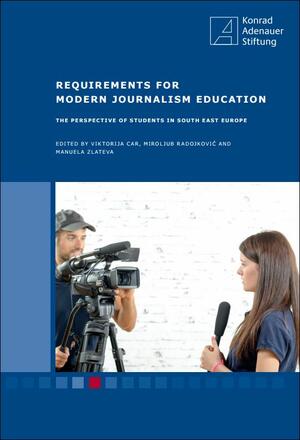
KAS - Journalism Education in South East Europe
With the recently published study "Requirements for modern journalism education - The perspective of students in SEE", the Media program of the Konrad Adenauer Stiftung (KAS) highlights challenges and needs for journalism education in the SEE region.
The research is based on a survey conducted from February to March 2015 in Albania, Bulgaria, Croatia, Romania and Serbia with 531 students from state and private universities.
The main objective of the survey is to analyse the attitudes of journalism students and to give an answer to the following questions: what motivates a student to pursue an education in journalism; are students satisfied with the learning conditions; what are their recommendations for study programme improvement?
Framing these issues against the background of current challenges for journalism in the region, the study focuses on the question – “What kind of university education for journalism can survive in the environment of information society in the twenty-first century?”
The study includes case studies presenting the specific situation of the journalistic profession in each of the countries considered, highlighting the most impacting processes which characterize every national context. The impact of transition and media reforms is also considered, both on a country-level and with a region-wide perspective.
In addition, the study provides chapters on new teaching methods and better education equipment, education challenges created by the digital media and a comparative analysis of the common challenges in South East Europe.
Building on the insights gathered in this publication, recommendations are formulated which address state authorities, representatives of media industry and the institutions of higher education.
A first concern raised is the fact that, with the exception of Albania, “in all reports presented there are utterances telling that number of studying and graduating journalists goes far above demand at the marketplace”. Shall this trigger the introduction of limitations in the number of students enrolling each year in journalism studies? How compatible is this with the idea that students should be able to engage in the curriculum they prefer? The question is clearly open for debate.
Another dilemma resulting from the transformative processes affecting both the journalistic profession and media landscapes, is whether journalism education should “either to educate future ‘journalists’ capable of managing a wide range of duties concerning information flow and media operation, or to prepare narrowly specialised journalists being able to perform a journalistic job of excellence.”
The study “Requirements for Modern Journalism Education. The Perspective of Students in South East Europe” is published by KAS (Konrad-Adenauer-Stiftung) and edited by notable experts Viktorija Car, Miroljub Radojković and Manuela Zlateva.
Tags: Journalism education Ethics of journalism Western Balkans Albania Bulgaria Croatia Romania SerbiaThe content of this article can be used according to the terms of Creative Commons: Attribution-NonCommercial 4.0 International (CC BY-NC 4.0) . To do so use the the wording "this article was originally published on the Resource Centre on Media Freedom in Europe" including a direct active link to the original article page.

